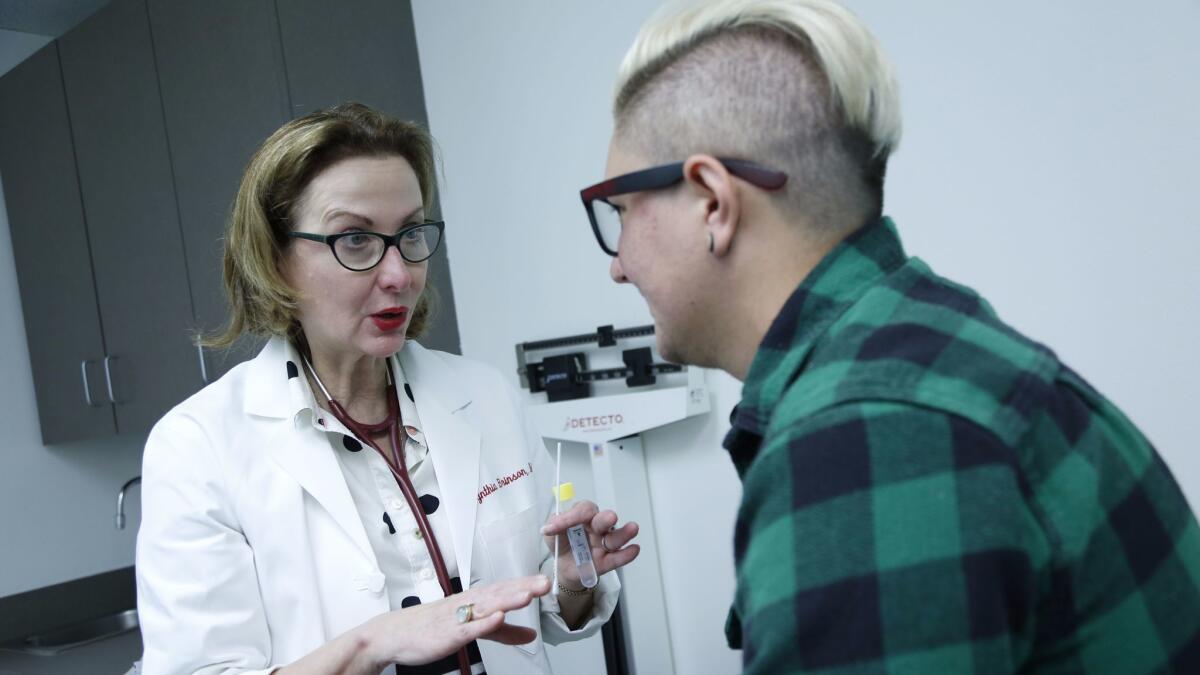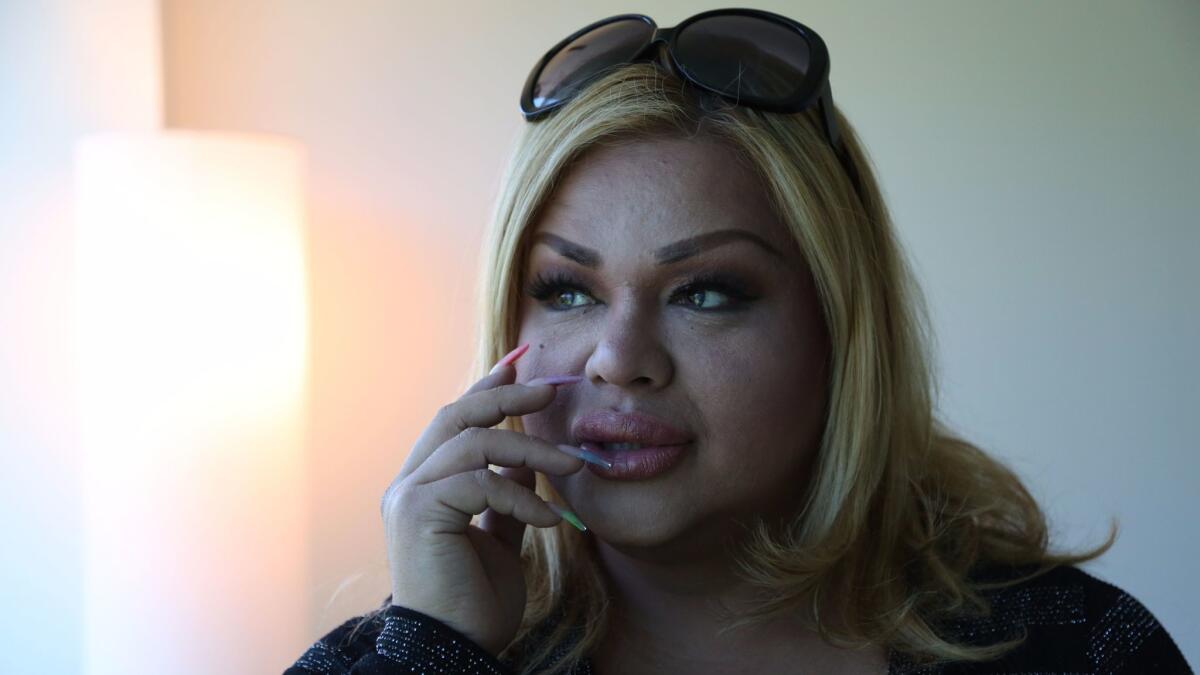How doctors in Texas are trying to protect transgender patients from a persistent threat: HIV

The Kind Clinic in Austin, Texas, began offering free and low-cost hormone therapy for transgender people in March. That connection enables doctors to offer them HIV care too.
- Share via
Reporting from AUSTIN, Texas — When the Kind Clinic began offering free or low-cost hormone therapy for transgender people in March, word spread quickly here. Within days, the service was booked up until the end of June. Now the next available appointment is in December.
For the patients flocking to the clinic north of downtown — the first of its kind in central Texas — it’s a chance to begin a transition many thought they could not afford. But for the doctors, the rush is a chance to start addressing another major health problem facing the transgender community: the staggering rates of HIV.
By offering hormone therapy, the clinic aims to earn the trust of a population that often feels alienated by mainstream medicine and persuade those at high risk of exposure to the virus to start on a drug regimen that can prevent infection.
The U.S. Food and Drug Administration approved a regimen marketed as Truvada for use as a pre-exposure prophylaxis against HIV in 2012, but it is not widely prescribed.

“Is that just available to anyone?” Peter Haley, a 27-year-old transgender patient, asked a Kind Clinic doctor when she told him about Truvada.
The doctor, Cynthia Brinson, explained that the clinic would first want to provide counseling about the medicine and do a series of tests to rule out a preexisting HIV infection and other potential complications. But if everything checked out, she said, the clinic would provide a prescription and help filling it at little or no cost.
Haley had come to the clinic because he was no longer covered by his mother’s insurance and couldn’t afford the $100-a-month prescription for testosterone injections or routine visits to the doctor.
Recently married, he didn’t think he was in any immediate danger from HIV. But he left the clinic with a stack of leaflets about pre-exposure prophylaxis, or PrEP.
“I have a lot of friends who probably should know about it,” he told the doctor.
A 2013 review of the limited research estimated that as many as 22% of transgender women in the U.S. were living with the AIDS-causing virus — a rate 27 times higher than for the general population of reproductive age (15 to 49). More than half of African American transgender women could be infected, according to one study. The risk to transgender men is believed to be lower, although there is even less data about them.
The population is so vulnerable because the stigmatized place that transgender people occupy in society translates into extremely high rates of poverty, substance abuse, mental health difficulties, homelessness and incarceration — all of which increase the odds of having sex without condoms or sharing needles, the two most common ways that HIV is spread in the U.S.
Finding a job can be especially difficult for some transgender women, so they may turn to sex work, which puts them in even greater danger. Many clients don’t want to use condoms, they say, and assaults are common.

Many of those living with HIV refuse to get tested or treated because of bad experiences at mainstream medical facilities.
A survey by the National Center for Transgender Equality in 2015 found that 23% of the nearly 28,000 respondents hadn’t seen a doctor when they needed one in the last year, because they were afraid of being mistreated. A third couldn’t afford to see one.
Of those who had consulted a healthcare provider, a third reported being refused treatment, verbally harassed, assaulted or subjected to some other mistreatment.
“You go to the doctor to seek help, but they act like they’re disgusted by you sometimes,” said Kelly Kline, 42, one of the Kind Clinic’s first transgender patients.
She recalled the New Year’s Eve that she came down with pneumonia and had to go to the emergency room.
“Everyone was so nice, until they asked for my ID,” she said. “Then the receptionist, in front of everybody, asked, ‘So, you’re a man?!’”
The doctor did a double take when he saw her and checked her chart.
“I’m so sorry,” she recalled him saying. “They told me there was supposed to be a man on my table.”
Kline, a community activist who hosts a popular drag show at an Austin nightclub, said she has lost count of the number of friends who have died of AIDS-related complications — “so many people.” Some refuse to get tested because they can’t face the possibility of an HIV diagnosis. But others are afraid of how they will be received.
Because transgender people feel so unwelcome at many medical facilities, opportunities for preventing the spread of HIV — the best hope for containing the virus short of a cure or a vaccine — are being missed.
The Austin clinic began in 2015 with the aim of making Truvada more easily available to those at high risk of contracting the virus. That includes anyone who is in a relationship with an HIV-positive person, gay and bisexual men who do not regularly use condoms with partners whose HIV status they don’t know, and anyone who sometimes shares equipment to inject drugs or hormones.
Taken daily, the medicine has been shown to reduce the risk of infection by more than 90%.
Though public health officials in Texas and across the nation have made it a component of their strategies against the virus, the U.S. Centers for Disease Control and Prevention has said that many primary care doctors and nurses remain unaware of it.
The medicine has also faced opposition from some doctors and AIDS activists who argue that offering people another way to block HIV transmission would undermine long-standing efforts to promote the use of condoms, a method that is also effective against other sexually transmitted infections. The CDC issued guidelines in 2013 stipulating that PrEP should be used with condoms.
Some doctors in Texas — which sees 4,000 new infections each year — also object to the medicine on moral grounds, arguing it encourages promiscuity and intravenous drug use.
Brinson, who in addition to being the clinic’s medical director provides care at the county jail, recalled having to break the news to an inmate that he was HIV-positive. The man was stunned because he had tested negative just three months prior.
“Well, did they offer you PrEP?” she asked him. No, he had never heard of the regimen.
“Just having people continually come in to be tested but not offering them a prevention seemed ludicrous,” she said.
Most of the people who work at the clinic are volunteers, and the care is free, thanks to a combination of public and private funding. The clinic can also help patients cover the prescription costs for Truvada, which run over $1,600 a month without insurance.
By the end of last year, the clinic was providing the medicine to 800 patients, most of them gay or bisexual men, who account for the majority of new HIV infections in the U.S.
But the doctors worried about how few transgender people were coming in. So they reached out to community representatives, who pointed out that for many transgender people, HIV is a secondary concern to obtaining the hormones they need to transition. The observation was borne out by recent studies that recommend combining HIV and gender care services for these patients.
And so the clinic began offering hormone therapy.
“Our strategy is around getting to zero [new infections], and you can’t do that without addressing the needs of the transgender community in a way that makes sense to them,” said Joe McAdams, the Kind Clinic’s executive director.
At first, the clinic offered gender care appointments one evening each week. To meet the growing demand, it recently added weekend hours and is planning to move to larger premises in August.
More than a quarter of the transgender patients decide to try Truvada, said McAdams, who has been living with HIV himself for 30 years.
One of them is Kline. She now takes a blue pill every morning with her allergy medicine.
She loves coming to the clinic. On her first visit, she was offered a questionnaire that asked about her gender identity, the sex she was assigned at birth and what pronouns she prefers.
“Other doctors have never, ever asked about it,” she said.
Twitter: @alexzavis
More to Read
Sign up for Essential California
The most important California stories and recommendations in your inbox every morning.
You may occasionally receive promotional content from the Los Angeles Times.











